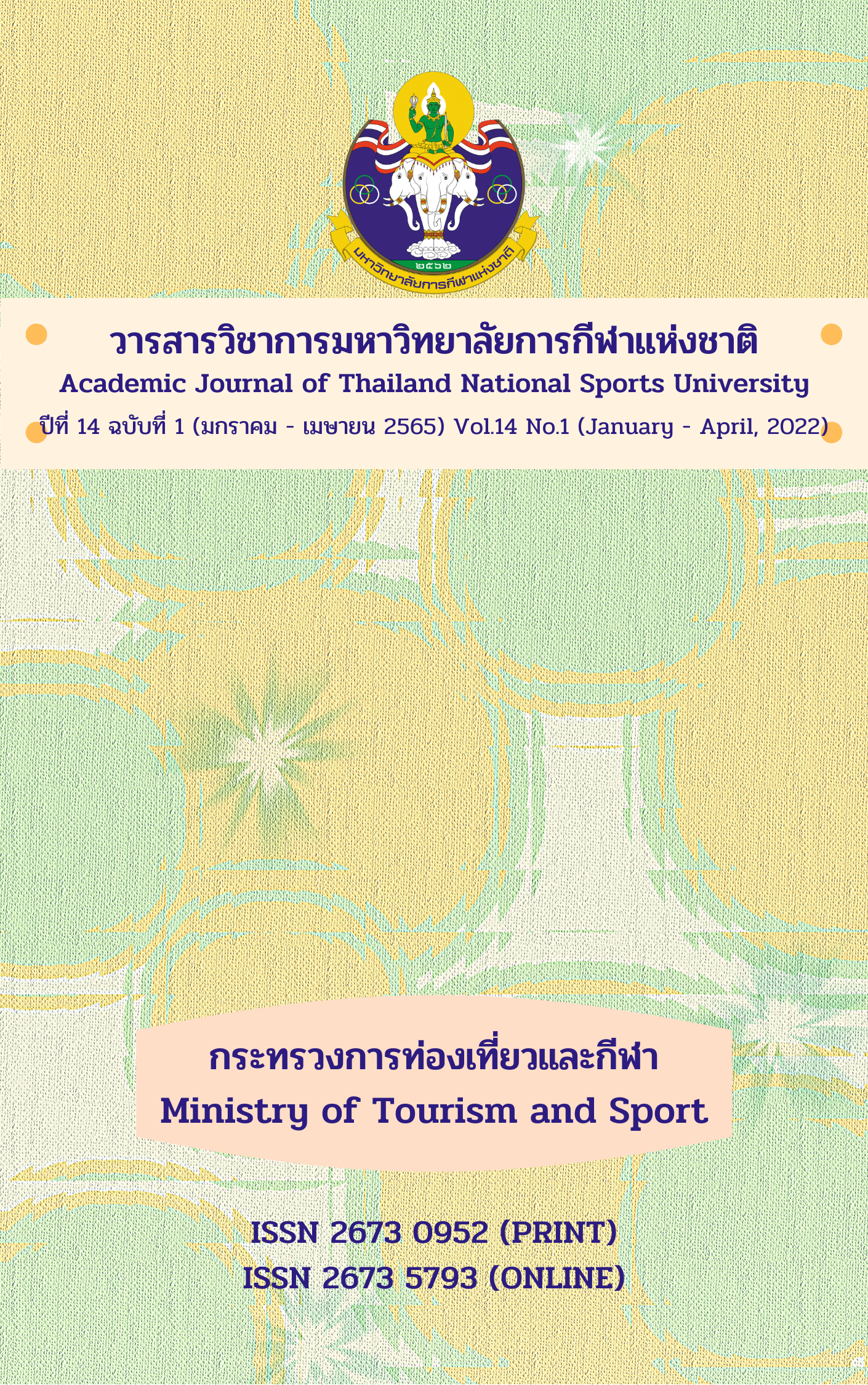DEVELOPMENT OF SPECIFIC ENGLISH COMMUNICATION SKILLS FOR CADDIES IN CHIANG MAI
Main Article Content
Abstract
Abstract
The objectives of this research were 1) to study the opinions of caddies in Chiang Mai towards English lessons 2) to develop specific English communication skills for caddies in Chiang Mai. The research method used to select the sample group by choosing the sample group in Chiang Mai and English lessons were created by experts for collecting data and analyzing results according to the research objectives set. The data will be collected 2 times as pre-test – post-test design, for a period of 3 months. This was a sample group of 30 caddies in Chiang Mai. The research tools used in this study were questionnaires and the English communication proficiency pre-test and post-test as follows:
- English lessons to develop specific English communication skills .
- The English communication proficiency test .
- The opinion questionnaire of caddies towards attending the training
The results showed that:
The highest graded educational outcome was the length of time spent in training and the place used for training (mean= 4.16). The opinion of caddies in Chiang Mai towards English lessons to develop specific English communication skills .Most of the respondents agreed on the length of time it took to complete the training and the place used for training followed by the suitability of the media used in the training and the knowledge gained is beneficial to the profession. Starting content from easy to difficult, appropriate and easy to understand The appropriateness of activities to its content, lecturer's lecture and English lessons used for training.
Comparison of the difference in English language skills training scores , it was found that the scores and knowledge after the post-test were higher than the scores before the pre-test of the sample groups had a statistically significant difference at the 0.05 level.
Keywords: skill development, specific English, caddies
Article Details

This work is licensed under a Creative Commons Attribution-NonCommercial-NoDerivatives 4.0 International License.
The published article is a copyright of the Academic Journal of Thailand National Sports University. The passage appeared in each article in this academic journal is a perspective of each author which is not related to the journal. Each author is required to be responsible for all components of his/her own article. If there are any mistakes, each author must be responsible for those mistakes on his/her own.
References
Aiguo, W. (2007). Teaching aviation English in the Chinese context: Developing ESP theory in a non - English Speaking County. English for specific purposes.
Bartow, F L. (1991). Workforce Education: Hotel and motel workers a section 35 demonstration project. Retrieved from www.elsevier.com/locate/esp
Brown, T. P., & Lewis, M. (2003). An ESP project: Analysis of an authentic workplace conversation. English for Specific Purposes, 22(1). Retrieved from https://www.learntechlib.org/p/96809/
Chantach Wannathanom. (2009). Tourism Industry. First Edition, Bangkok: Samlada.
Dao Sangboon. (2000). Creation of English language documents for tourism communication for 3rd year tourism development students, Maejo University Chiang Mai Province (Master’s thesis), Silpakorn University.
Laborda, J. (2010). Fostering Face to Face oral interaction through Web Quests: A Case study in ESP for tourism. Retrieved from www.elsevier.com/locate/esp
Mackey, A., & Silver, R. E. (2005). Interactional tasks and English L2 learning by immigrant children in Singapore. System, 33(2), 239-260. Retrieved from https://doi.org/10.1016/j.system.2005.01.005
Panit Boonyawathana. (1999). English language requirements in tourism business. Chiang Mai: English Section Faculty of Humanities, Chiang Mai University.
Pratana Srisuk. (2001). Development of English courses for tourism for students in grade 6, Samut Prakan Province (Master’s thesis), Burapha University.
Rujjiporn Buakaew. (2006). Development of a practice exercise to enhance English speaking skills for hotels for students in the field of hotel management. Department of Teaching English as a Foreign Language. Rajamangala University of Technology.
Shao Wen Su. (2009). Designing and delivering an English for Hospitality Syllabus: A Taiwanese case study. RELC Journal, 40(3). Doi: 10.1177/0033688209343845. Retrieved from https://www.researchgate.net/publication/258182760_Designing_and_Delivering_an_English_for_Hospitality_Syllabus_A_Taiwanese_Case_Study
Smith, P., & King, R. (1992). Laubach Way to English Workplace Curriculum. Retrieved from www.elsevier.com/locate/esp
Sureewan Chatanantawet. (1994). Effects of listening-speaking English activities. For tourism and hotel students by using interactions between students in the classroom (Master’s thesis), Kasetsart University.
Tourism Authority of Thailand. (2016). Strategy of the Ministry of Tourism and Sports. Bangkok: Ministry of Tourism and Sports.


